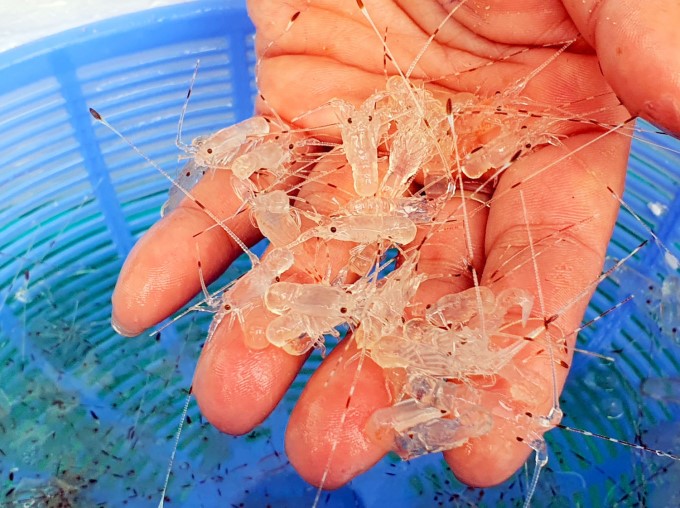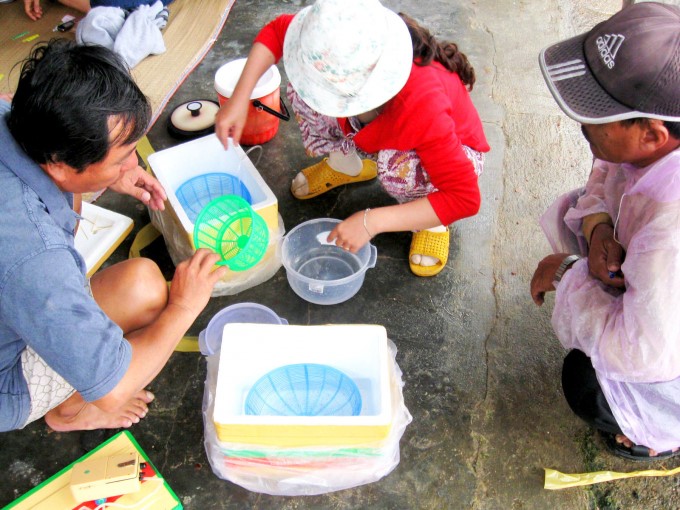June 17, 2025 | 01:48 GMT +7
June 17, 2025 | 01:48 GMT +7
Hotline: 0913.378.918
June 17, 2025 | 01:48 GMT +7
Hotline: 0913.378.918
The Department of Agriculture and Rural Development of Phu Yen has recently collaborated with the People’s Committee of Song Cau town to inspect the implementation of lobster seeds’ quarantine and trading in this locality.
Accordingly, Song Cau town has 28 lobster seed business facilities, including 13 big facilities importing seeds directly from Khanh Hoa province. The rest are small facilities, mainly distributing seeds for the facilities above.

Lobster seeds. Photo: AN.
Through inspection, many facilities hide and did not cooperate with the mission. As a result, in 2 days, the inspection team could only check 4 lobster seed trading facilities. The facilities claimed that from the beginning of 2021 up to now, all of the batches of lobster seeds transported to the province were registered for quarantine at the veterinary authority of Khanh Hoa province.
According to Phu Yen Sub-Department of Livestock Production and Animal Health, from the beginning of 2021 up to now, the Department has quarantined 2,989,500 lobster seeds exported to Phu Yen. The disease testing and quarantine for lobster seeds are fully implemented by functional agencies according to regulations, ensuring requirements for domestic consumption.
However, most farmers have yet to care and ask the seller to provide a quarantine certificate and related documents to prove the origin of the lobster seed batches. Therefore, businesses usually do not provide the buyer with a quarantine certificate for the consignment from Khanh Hoa to Phu Yen.
While the number of traffic junction quarantine forces is limited, the time to import seeds is not fixed, and lobster seeds are directly sold and delivered in the farming areas. Therefore, it is difficult for the functional sector to detect and handle quarantine and transport regulation violations, making them unable to completely control the amount of lobster seed imported to the province.

Lobster seeds trading in Song Cau town (Phu Yen). Photo: AN.
From the beginning of 2021 up to now, the lobster seed business facilities in the Song Cau town area mainly import tropical rock lobsters (originating from the Philippines) which have been quarantined by the Sub-Department of Livestock Production and Animal Health of Khanh Hoa. These facilities only sell to breeding farmers in areas of Tuy An district, Dong Hoa town and Song Cau town. However, the survival rate of the recent batches of lobster seeds in these areas is lower than in previous years, averaging about 50-60%.
Therefore, in the coming time, the Department of Agriculture and Rural Development of Phu Yen will establish an interdisciplinary mission, strengthen the inspection and examination of imported lobsters to Phu Yen; have solutions to manage, detect and strictly handle cases of transporting imported lobster seeds without being quarantined and violating the regulations on seed quality management as well as organizing the quarantine work for the batch of lobster seed imported to Phu Yen according to regulations.
The Department of Agriculture and Rural Development of Phu Yen will direct affiliated specialized agencies to coordinate with local authorities and relevant agencies to guide and disseminate regulations on the management and trading of lobster seed to organizations. individuals; to propagate and encourage breeders to choose and purchase breeds that have quality insurance and quarantine certificates, have disease testing according to regulations and register for initial declaration according to regulations.
Translated by Samuel Pham

(VAN) The working delegation from the Ministry of Agriculture and Environment conducted an important trip to the Netherlands to strengthen strategic partnerships and sustainable development in the agricultural sector.

(VAN) The letter ‘A Plea from the Ocean’ not only evokes emotion but also awakens the human conscience to the responsibility of protecting life on Earth.

(VAN) The Department of Agriculture in South Africa has announced the country’s first mass vaccination of poultry to prevent local birds from contracting avian influenza.

(VAN) Establishment of the Mekong Delta Regional Agricultural Linkage Center, aiming for a closed value chain, deep processing, trading platforms, and international market connectivity.

(VAN) Gia Lai province has recently recorded 460 rare species of animals and plants, contributing to forest conservation and biodiversity planning in the region.

(VAN) Ms. Caroline Beresford, New Zealand Ambassador to Vietnam, expressed confidence that agricultural cooperation between Vietnam and New Zealand will develop sustainably, be climate-resilient, and promote gender equality.

(VAN) Vietnam reaffirms its commitment to international cooperation in fostering sustainable and responsible fisheries while ensuring resilient livelihoods for small-scale fishing communities.